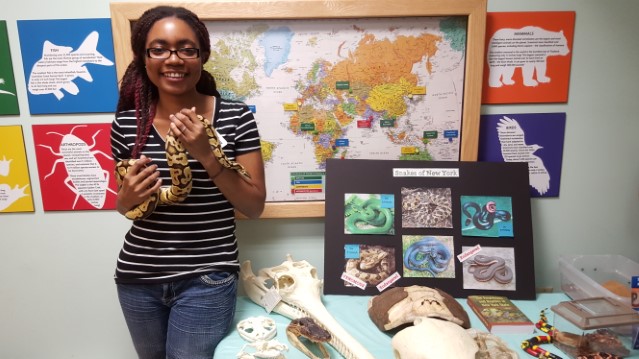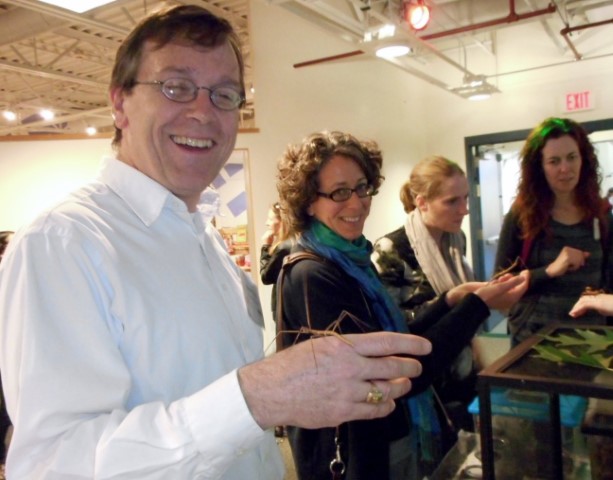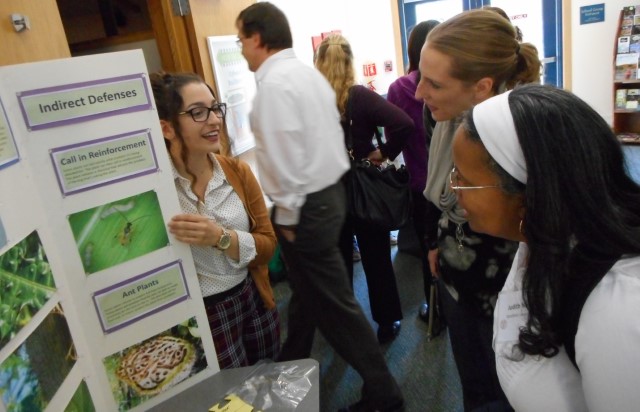Educators meet to bolster undergrad STEM outreach
By Blaine Friedlander


Educators from around the nation with a strong desire to promulgate scientific knowledge and teach tomorrow’s teachers met to learn new ways to train undergraduate students in effective instruction Oct. 10-12 at Cornell’s “Improving Undergraduate Education Through Science Outreach” workshop, held on campus and at Ithaca’s Sciencenter.
“For undergraduate students, conducting science outreach directly benefits their own engagement and skill in STEM education,” said Linda Rayor, senior lecturer and senior research associate in entomology, who organized the workshop and runs Cornell’s Naturalist Outreach program. The National Science Foundation funded the workshop.
“Formally training undergraduates in effective scientific outreach greatly enhances the probability that these students will go on to become STEM teachers or to continue to do informal education that communicates the value of science to the public through their own careers,” she said.
Cornell’s Naturalist Outreach Program acts as a STEM speaker’s bureau to send Cornell undergraduates and graduate students to Ithaca-area classrooms and community groups to talk about the natural history, ecology, plants and the behavior of animals. “We train Cornell students to communicate with passion and clarity about science,” Rayor said. “My goal is to inspire Cornell students to become civically engaged in scientific outreach so that there is a multiplying effect as they take their skills and passion well beyond Cornell.”
For colleges throughout the country, starting an outreach program can be trial by fire. In this weekend workshop, the educators learned how to organize community science outreach events, create connections with local science museums or nature centers, and how to reach local teachers to bring college student mentors into their classroom.

Cornell undergraduate naturalists demonstrated their own outreach expertise by hosting small exhibits and speaking. They were: Ph.D. candidate Laura Figueroa, on pollination; Erica Forstater ’16, on wetlands; Sierra Helmann ’16, on whales; Erin Mattoon ’16, on plants; Kathleen Webster and Morgan Shelton, on snakes; and Ann Dunn ’18, Danielle Rutkowski ’18 and Elias Diakolios ’18 conducting a mini-Insectapalooza.
Heather Pacheco-Guffrey, assistant professor of Bridgewater (Massachusetts) State University, networked and gained ideas from others at the workshop. “This seems to be a mini-convention for outreach educators,” she said. “I hope to gain a better understanding of informal learning.”
Jennifer Aizenman, director of Bridgewater State University’s Center for the Advancement of STEM Education, explained that she gathered new ideas for engaging students. Cindy Ghent, assistant professor of biology at Towson (Maryland) State University, said, “A scientifically literate public is what we’re looking for, so it is important to train undergraduates to conduct outreach.”
Along with Rayor, workshop presenters included Bryan Duff, Cornell education lecturer; Sarah Fiorello, interpretation coordinator at Cornell Plantations; Michelle Kortenaar, director of education at the Sciencenter; Bruce Lewenstein, chair of the Department of Science and Technology Studies; Raylene Ludgate, youth education coordinator at Cornell Plantations; Rob Ross, associate director of outreach for the Museum of the Earth; and Julianna Van Sant, a teacher at Dryden Elementary School.
Media Contact
Get Cornell news delivered right to your inbox.
Subscribe